A pair of researchers in New Zealand made a surprising discovery several weeks ago while analyzing a pile of seal poop.
Nestled inside one of the excrement samples - about the size of two dinner rolls, if you must know - was something unusually hard: a USB stick.
Needless to say, memory drives are not a part of the marine food chain.
"It is very worrying that these amazing Antarctic animals have plastic like this inside them," said Jodie Warren, a volunteer with New Zealand's National Institute of Water and Atmospheric Research (NIWA), who found the USB stick.
Still, Warren and a fellow volunteer, Melanie Magnan, noticed that the memory drive appeared intact. So they set it out to dry and tested it a couple of weeks later.
Remarkably, it still worked, and images presumably belonging to its owner soon appeared: In one photo, a sea lion rolls in the sand on a beach. In a video, someone in a kayak follows a seal and her pup swimming in shallow water.
The only hints as to who had taken the footage were the blue kayak and a glimpse of a human's red-tipped rubber shoes.
NIWA is searching for the owner of a USB stick found in the poo of a leopard seal…
— NIWA (@niwa_nz) February 5, 2019
Recognise this video? Scientists analysing the scat of leopard seals have come across an unexpected discovery – a USB stick full of photos & still in working order! https://t.co/2SZVkm5az4 pic.twitter.com/JLEC8vuHH0
On Monday, NIWA published a few of the images on social media, hoping to find the owner of the USB stick - with a slight catch.
"If they're yours and you want the USB stick back, it comes with a price," the group stated.
"The leopard seal researchers would like some more leopard seal scat please."
They included instructions for how to identify and safely collect leopard seal scat, which they said is "good as gold" for researchers.
"It can tell them what these Antarctic predators eat, a little bit about their health and how long they may have been in New Zealand waters," NIWA said.
To help jog people's memory, the group also noted when and where the scat sample had been found. A local veterinarian - part of NIWA's "network of volunteer seal-scat collectors up and down the country" - gathered the poop in November 2017 from Oreti Beach in Invercargill, a city on the southern tip of New Zealand's south island.
The vet then sent it to Krista Hupman, a NIWA marine biologist, who kept it in a freezer for more than a year.
So far, no one has stepped forward to solve the marine mystery, though NIWA's widely shared posts did stimulate dozens of poop puns; at least one song about a constipated seal with lyrics set to Sting's "Message in a Bottle"; and numerous inquiries about the USB stick brand.
"Hold on. It was eaten by a seal, run through its digestive system, pooped out, collected, FROZEN FOR OVER A YEAR, thoroughly washed, AND IT STILL WORKS?" one Twitter user remarked. "That's some quality goods right there."
2019 © The Washington Post
This article was originally published by The Washington Post.
